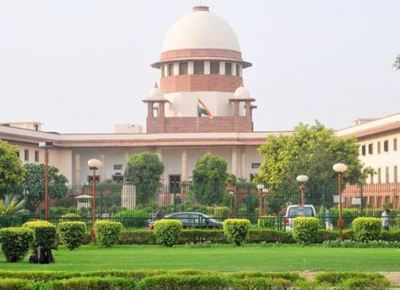- News
- India News
- Decision in 4 weeks on new law to regulate NGOs, their funding: Govt
Trending
This story is from July 13, 2017
Decision in 4 weeks on new law to regulate NGOs, their funding: Govt
The NDA government on Wednesday told the Supreme Court that a decision would be taken within four weeks on the need for a standalone law to regulate activities, funding and expenditure of non-governmental organisations (NGOs), lakhs of which have mushroomed across

New Delhi: The NDA government on Wednesday told the Supreme Court that a decision would be taken within four weeks on the need for a standalone law to regulate activities, funding and expenditure of non-governmental organisations (NGOs), lakhs of which have mushroomed across the country.
Additional solicitor general Tushar Mehta said the decision has to be taken at the highest level and sought four weeks to inform the court about it.A bench of CJI J S Khehar and Justice D Y Chandrachud said, “The issue is very serious. We do not want to push the government... Whether you want to enact a separate legislation or not, you have to take a decision.”
“Previously, we found that not many have filed audited accounts. The government has already initiated civil and criminal proceedings against defaulting NGOs. So, it is not as if there is no legal framework available to take action,” it said.
Petitioner-cum-advocate M L Sharma said that till date, not a single NGO was prosecuted “because 90% of NGOs are owned either by politicians or linked to bureaucrats”. On January 10, the SC had ordered governments to scrutinise accounts of lakhs of NGOs and voluntary organisations, which together received thousands of crores of rupees of public funds, and take civil and criminal action if they were found to have misused the grants. On April 5, the Centre had filed in the SC the draft guidelines to regulate NGOs and said all such organisations, which intended to receive funds from governments, must register afresh online with Niti Aayog’s ‘NGO-Darpan’ portal giving details of its past work, fund utilisation, yearly audit reports and key persons responsible for managing the NGO.
Another provision in the guidelines intends to deter non-serious NGOs from seeking government funds. It mandates NGOs and its office-bearers to execute a bond, equivalent to the fund amount received, promising to refund to the government with 10% interest the entire amount if the funds were found misused, misappropriated or not used for the purpose for which they were sanctioned.
The CBI had informed the SC that it had detected 32.97 lakh registered NGOs and voluntary organisations but less than 10% of them, 3.07 lakh, filed their audited accounts with the Registrar of Cooperative Societies.
The CBI was directed to find out the number of NGOs on a PIL filed by Sharma, who had accused Anna Hazare’s NGO of misappropriating funds allotted by the Council for Advancement of People’s Action and Rural Technology (Capart). The court said the problem of NGOs with no accountability was a much larger issue than the Rs 5 crore grant given to Hazare’s NGO.
Additional solicitor general Tushar Mehta said the decision has to be taken at the highest level and sought four weeks to inform the court about it.A bench of CJI J S Khehar and Justice D Y Chandrachud said, “The issue is very serious. We do not want to push the government... Whether you want to enact a separate legislation or not, you have to take a decision.”
“Previously, we found that not many have filed audited accounts. The government has already initiated civil and criminal proceedings against defaulting NGOs. So, it is not as if there is no legal framework available to take action,” it said.
Petitioner-cum-advocate M L Sharma said that till date, not a single NGO was prosecuted “because 90% of NGOs are owned either by politicians or linked to bureaucrats”. On January 10, the SC had ordered governments to scrutinise accounts of lakhs of NGOs and voluntary organisations, which together received thousands of crores of rupees of public funds, and take civil and criminal action if they were found to have misused the grants. On April 5, the Centre had filed in the SC the draft guidelines to regulate NGOs and said all such organisations, which intended to receive funds from governments, must register afresh online with Niti Aayog’s ‘NGO-Darpan’ portal giving details of its past work, fund utilisation, yearly audit reports and key persons responsible for managing the NGO.
“The registration system should facilitate seamless operation of applicable provisions of Income Tax Act and Foreign Contribution Regulation Act (FCRA) with respect to NGOs without the need for cumbersome and intrusive processes, which create mutual distrust and scope for misuse,” the draft guidelines said.
Another provision in the guidelines intends to deter non-serious NGOs from seeking government funds. It mandates NGOs and its office-bearers to execute a bond, equivalent to the fund amount received, promising to refund to the government with 10% interest the entire amount if the funds were found misused, misappropriated or not used for the purpose for which they were sanctioned.
The CBI had informed the SC that it had detected 32.97 lakh registered NGOs and voluntary organisations but less than 10% of them, 3.07 lakh, filed their audited accounts with the Registrar of Cooperative Societies.
The CBI was directed to find out the number of NGOs on a PIL filed by Sharma, who had accused Anna Hazare’s NGO of misappropriating funds allotted by the Council for Advancement of People’s Action and Rural Technology (Capart). The court said the problem of NGOs with no accountability was a much larger issue than the Rs 5 crore grant given to Hazare’s NGO.
End of Article
FOLLOW US ON SOCIAL MEDIA










